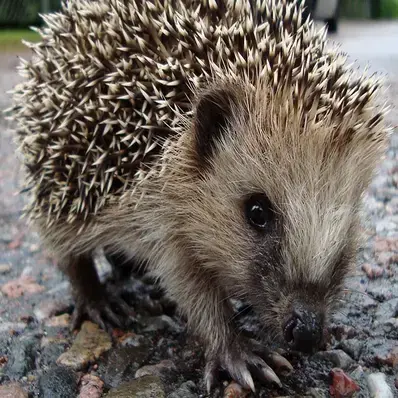History/Origin
The European Hedgehog, also known as the Common Hedgehog or by their scientific name, Erinaceus Europaeus, is native to Europe.
It is a nocturnal creature, making it a mysterious presence in many European folktales and stories.
The hedgehog has been a part of European wildlife for thousands of years, with its fossilized remains dating back to the Ice Age.
- Native Habitat
This species is found in various countries, including the United Kingdom, France, Germany, Italy, the westwards of the British Isles, and other countries across the West European continent.
Their natural habitats can include woodlands, meadows, gardens, and urban areas.
- Population
Despite its widespread presence across Europe, the population of this mammal is experiencing a significant decline.
In Great Britain, the hedgehog population has dwindled from an estimated 30 million in the 1950s to around 1.5 million today. Due to these reasons, they have been red-listed in the UK.
Personality
European Hedgehogs are solitary animals with a big appetite. They are known for their curious nature and their unique defense mechanism – rolling into a ball when threatened. This behavior, combined with their spiky exterior, makes them a formidable opponent for predators.
Despite their prickly exterior, they are known to be quite friendly and can form a strong bond with their human caretakers.
Physical Appearance
European Hedgehogs are small animals with spikes on the upper body and soft fluff on the underbelly.
- Size
European Hedgehogs are small animals, typically measuring between 15 and 30 cm in length. Despite their small size, they are known for their big personalities and curious nature.
- Coat Color
Their backs are covered with spiky spines, and they have a soft underbelly. They are usually brown with a white or cream belly. The color of their spines can sometimes vary, with some hedgehogs having darker or lighter spines.
Gender Differences
Male and female hedgehogs are similar in appearance, although males are usually slightly larger.
It can be difficult to tell the difference between male and female hedgehogs, as they are subtle and often require a close examination.
Feed/Nutrition
Hedgehogs are insectivores. They eat a variety of insects, as well as small mammals, bird eggs, frogs, fruit, and fungi. If kept as pets, they can be fed a diet of cat food, as it contains the necessary nutrients. It’s also important to provide fresh water for your hedgehog.
Health
Hedgehogs can suffer from a variety of health issues. Here are some of the common diseases a European Hedgehog can commonly suffer from:
- Fungal Infections: Fungal infections are fairly common in European hedgehogs. The most prevalent among these is ringworm.
- Metabolic Bone Disease: Over-consumption of food with a low calcium-to-phosphorous ratio, such as peanuts and mealworms, can result in inflammation and metabolic bone disease. This is an umbrella term for a variety of conditions, including bone thinning and osteoporosis.
- Dietary Issues: Hedgehogs tend to eat almost anything they have unrestricted access to. High-fat foods can result in hepatic steatosis (fatty liver disease), obesity, and complications seen in humans with similar diets.
- Oral and Dental Diseases: Oral neoplasia, particularly squamous cell carcinoma, is common in hedgehogs. Dental diseases, including calculus, gingivitis, and periodontitis, are also common.
Care and Grooming
Hedgehogs are low-maintenance pets, but they do require some care. This includes regular cleaning of their habitat and careful handling. Despite their spiky exterior, hedgehogs can be handled with bare hands. However, it’s important to be gentle as they can be sensitive.
Rescue Groups
Numerous hedgehog rescue groups across Europe work to rehabilitate injured and sick hedgehogs. These organizations are dedicated to the welfare of hedgehogs.
Here are some of the hedgehog organizations you can reach out to:
European Hedgehog for Sale
European Hedgehogs are an endangered species, that have not been domesticated. Keeping them as pets is also illegal in some countries.
However, if you want to keep an adorable and domesticated breed of these creatures, check out these organizations:
Interesting Facts
- Hedgehogs are immune to most snake venom.
- They have poor eyesight but an excellent sense of smell and hearing.
- European Hedgehogs have between 5000 and 7000 spines.
- Hedgehogs are a forgotten third symbol of NATO.
Best For
Hedgehogs are best suited to being solitary pets. They are ideal for those who want a low-maintenance pet with a bit of personality! They are also great for those who are interested in exotic pets and are willing to put in the time and effort to understand and care for them.
Top European Hedgehog Names
| Male European Hedgehog Names | Female European Hedgehog Names |
| Prickle | Rosie |
| Thimble | Hazel |
| Cactus | Clover |
| Quill Smith | Pippa |
| Sonic | Quill-izabeth |










